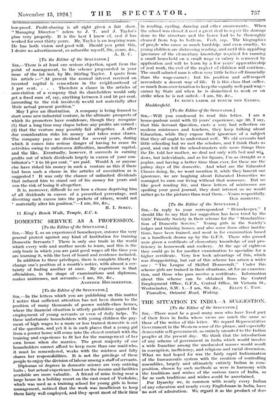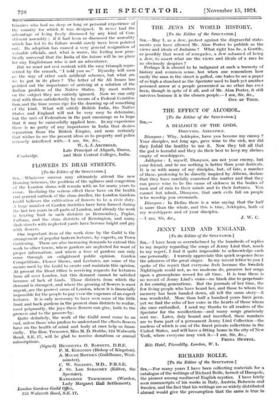THE SITUATION IN INDIA—A SUGGESTION.
[To the Editor of the SPECTATOR.] SIP.,—There must be a good many men who have lived part of their lives in India whose views are much the some as those of the writer of this letter. We regard Representative Government in the Western sense of the phrase, and especially democratic self-government, as entirely unsuited to the Indian peoples at the present day. We think that the introduction of any scheme of government in India which would involve a wide franchise among the uneducated masses would result in corruption, inefficiency, and religious and racial dissension. What we had hoped for was the fairly rapid Indianization of the bureaucratic system with the creation of controlling assemblies, largely and ultimately entirely Indian in com- position, chosen by such methods as were in harmony with the traditions and wishes of the various races of India, so far as such traditions and wishes could be ascertained.
For Dyarchy we, in common with nearly every Indian of any education and nearly every Englishman in India, have no sort of admiration. We regard it as the product of doc-
trinaires who had no deep or long or personal experience of the country for which it was designed. It never had the advantage of being freely discussed by any kind of Con- stituent assembly ; if it had been so discussed the unreality which has led to its failure would surely have been pointed out. Its adoption has caused a very general resignation of valuable officials, and, what is worse, the feeling now prac- tically universal that the India of the future will be no place fin. any Englishman who is not an adventurer.
But we must not rest content with the easy triumph repre- sented by the remark, "I told you so." Dyarchy will soon go the way of other such artificial schemes, but what are we to put in its place ? The letter of Sir Ali Imam has pointed out the importance of arriving at a solution of the Indian problem of the Native States. By most writers on the subject they are entirely ignored. Now we can only deal with them satisfactorily by means of a Federal Constitu- tion, and the time seems ripe for the drawing up of something of the kind. What will satisfy British India, the Native States and England will not be very easy to determine, but the uses of Federalism in the past encourage us to hope that it may be successfully applied here. In my experience there is no party of any importance in India that desires separation from the British Empire, and none certainly that wishes to see the present ideas as to property and police seriously interfered with.—I am, Sir, &c.,
W. A. J. ARCHBOLD,
Late Principal of Aligarh, Dacca,
Cambridge. and Muir Central Colleges, India.











































 Previous page
Previous page